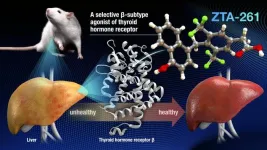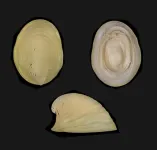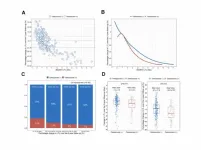(Press-News.org) To protect the Amazon and support the wellbeing of its people, its economy needs to shift from environmentally harmful production to a model built around the diversity of indigenous and rural communities, and standing forests.
A group of conservationists from Bolivia, Brazil, Peru, Ecuador, the US and the UK say that current conservation and development efforts will never sustain or scale without systemic changes in how economies are designed.
Despite extensive destruction of the Amazon in the name of economic development, Amazonian communities have seen little improvement in income, life expectancy, and education. The researchers have proposed a new model and associated policy changes that could create fair and sustainable futures for the Amazon and its people by improving infrastructure, supply chains, and social organisations.
Their results, reported in the journal Nature Ecology and Evolution, are focused on the Amazon, however the researchers say similar economic models could be implemented around the world if the political will exists.
The Amazon basin is home to the world’s largest tropical rainforest, representing over half of the world’s remaining rainforest, and stores vast amounts of carbon. However, decades of large-scale deforestation, as well as the increased risk of fires and floods due to climate change, has put much of the Amazon rainforest under threat. In addition to what the loss of the Amazon would mean for global carbon emissions, the rainforest is also home to many indigenous peoples and thousands of species of plants and animals.
“We need a different vision for the Amazon if we’re going to protect it,” said lead author Professor Rachael Garrett from the University of Cambridge’s Department of Geography and the Conservation Research Institute. “Half a century of deforestation and exploitation of the Amazon has not resulted in widespread development, and now the economic value of deforested areas is threatened, not to mention the threats to the global climate and water security.”
Working with colleagues from the Amazonian region, Garrett has proposed building on the success of indigenous and traditional communities to develop new economies, which could protect much of the Amazon while also improving the livelihoods, health, and food security of the many people who live there. These economic models are known as socio-bioeconomies, or SBEs.
“Conventional economic models can result in short-term gains, but over the longer term, the people and resources of the Amazon basin have been exploited by powerful interests, while there has been an underinvestment in education, innovation, and sustainable infrastructure,” said Garrett. “The conventional economic model is simply not sustainable.”
The SBE model is focused on using and restoring Amazonian and other ecosystems sustainably, and supporting indigenous and rural communities. An SBE economy might include eco-friendly tourism, or the sustainable harvest and processing of plant products into valuable foods, beverages, clothing, and medicines.
“A limited range of interests are controlling the development agenda in most countries,” said Garrett. “The only way we can change that is improving the rights and representation of the people who are not benefiting from the systems and are being harmed by ongoing environmental destruction. We believe it is possible to have win-wins for humanity and conservation, but not if we continue to consume products that have a massively negative impact. SBEs can help put these win-wins into policy and practice.”
Garrett cites the footwear brand Veja as an example of such a win-win. The French company buys the rubber for its sneakers from small-scale Amazonian rubber farmers, and purchases 100% of the responsibly harvested native rubber in Brazil. As part of its sustainability efforts, the company focuses on building communities of small-scale farmers and has been financially successful without traditional advertising.
Garrett and her collaborators are calling for massive increases in social mobilisation, technology and infrastructure to support SBEs. Under an SBE model, governmental subsidies would be redirected away from agribusiness and toward smaller-scale sustainable development. The researchers also outline how to build connections between rural and urban policies in SBEs. An example is the establishment of public procurement programmes where healthy and sustainably produced foods are purchased directly from indigenous and small farming communities and served in school lunch programmes and hospitals, instead of supporting large-scale agribusiness engaged in degrading practices.
Other policy changes that could support an SBE model include redirecting finance to conservation and restoration activities, supporting community enterprises, and ensuring participatory processes to ensure inclusive, long-term benefits.
“It’s possible to have an economy that is strong and works for everyone when we dare to develop new models and visions that recognise the interconnectedness of people and nature,” said Garrett. “By popularising these ideas, investing in people and businesses who are making a difference, and supporting research into SBE innovation we can support a transformation in both conservation and development in the Amazon.
“The SBE model could help protect the Amazon and its people while avoiding climate and biodiversity disasters, but there needs to be the political will to make it happen.”
Rachael Garrett is the incoming director of the University of Cambridge Conservation Research Institute and a Fellow of Homerton College, Cambridge. She is a council member of the Cambridge Conservation Initiative and serves on the UN Science Panel for the Amazon.
END
A new way of thinking about the economy could help protect the Amazon, and help its people thrive
2024-08-06
ELSE PRESS RELEASES FROM THIS DATE:
Controlling lipid levels with less side effects possible with new drug
2024-08-06
Scientists at Nagoya University in Japan have made a significant breakthrough in treating lipid disorders. They have developed a new compound, ZTA-261, which selectively binds to the thyroid hormone receptor beta (THRβ). THRβ plays an important role in the regulation of lipid metabolism, which affects lipid levels in the blood. Mice administered the drug showed decreased lipid levels in the liver and blood, with fewer side effects in the liver, heart, and bones compared to existing compounds. These findings, published in Communications Medicine, suggest that ZTA-261 ...
Research spotlight: Analyzing the effectiveness of heart therapies and outcomes for patients with chip
2024-08-06
Nicholas A. Marston, MD, MPH, of the TIMI Study Group and Carl J. and Ruth Shapiro Cardiovascular Center at Brigham and Women’s Hospital, is the corresponding author of a paper published in Nature Medicine, “Clonal hematopoiesis, cardiovascular events and treatment benefit in 63,700 individuals from five TIMI randomized trials.”
How would you summarize your study for a lay audience?
Clonal hematopoiesis of indeterminate potential (CHIP) is a condition that promotes the multiplication of blood stem cells in the body and increases the ...
Soft gold enables connections between nerves and electronics
2024-08-06
Gold does not readily lend itself to being turned into long, thin threads. But researchers at Linköping University in Sweden have now managed to create gold nanowires and develop soft electrodes that can be connected to the nervous system. The electrodes are soft as nerves, stretchable and electrically conductive, and are projected to last for a long time in the body.
Some people have a “heart of gold”, so why not “nerves of gold”? In the future, it may be possible to use this precious metal in soft interfaces to connect electronics to the nervous system for medical ...
The race to discover biodiversity: 11 new marine species and a new platform for rapid species description
2024-08-06
Accelerating global change continues to threaten Earth’s vast biodiversity, including in the oceans, which remain largely unexplored. To date, only a small fraction of an estimated two million total living marine species have been named and described. A major challenge is the time it takes to scientifically describe and publish a new species, which is a crucial step in studying and protecting these species. The current scientific and publishing landscape often results in decade-long delays (20-40 years) from the discovery of a new species to its official description. As an ...
18th Annual Q-Bio Conference: Global scholars explore new Frontiers in quantitative biology
2024-08-06
The 18th Q-Bio Conference on Quantitative Biology was held at the Guangming Yungu International Conference Center in Shenzhen from July 26 to 29, 2024. Organized by the Shenzhen Institute of Advanced Technology (SIAT) of the Chinese Academy of Sciences (CAS), the Shenzhen Institute of Synthetic Biology (iSynBio), and Peking University, the conference drew over 230 global researchers from countries including the U.S., U.K., France, India, Japan, Chile, and China.
Themed "Predictive Modeling and Quantitative Principles in Complex Biological Systems," the event explored future prospects in quantitative and synthetic biology. Under ...
Eating more fruits & vegetables to reduce dietary acid lowers blood pressure and improves kidney and heart health in patients with hypertension
2024-08-06
Philadelphia, August 6, 2024 – Doctors recommend making fruits and vegetables a foundational part of the treatment of patients with hypertension. Diets high in fruits and vegetables are found to lower blood pressure, reduce cardiovascular risk, and improve kidney health due to their base-producing effects. A new study in The American Journal of Medicine, published by Elsevier, details the findings from a five-year interventional randomized control trial.
Despite ongoing efforts to improve hypertension treatment and reduce its adverse outcomes with pharmacological strategies, hypertension-related chronic kidney disease and its cardiovascular mortality are increasing. Heart disease ...
Rising toll of serious injuries linked to expanded Mexico-US border wall crossing
2024-08-06
The expansion of the Mexico-US border wall crossing has been accompanied by a rising toll of serious injuries, with poor discharge care and a lack of appropriate interpreting facilities adding up to a “humanitarian and health crisis,” suggest researchers in the open access journal Trauma Surgery & Acute Care Open.
Thirty eight different nationalities and 21 languages other than Spanish were represented among those attempting to cross one segment of the wall in 2021 and 2022, say the researchers.
The Mexico-US border wall was extended by 50 miles and raised to a height of 30 feet in Southern California, construction ...
Interplay of sex, marital status, education, race linked to 18 year US lifespan gap
2024-08-06
The interplay of a quartet of sex, marital status, education, and race is linked to an 18 year lifespan gap for US citizens, and while no one factor is more influential than any of the others, the more of these influential factors a person has, the higher their risk of an earlier death, finds research published in the open access journal BMJ Open.
But a simple scoring system based on these characteristics can help overcome this complexity to identify those most at risk, say the researchers.
Individual risks and genetic factors explain part of the differences in health and death, but the evidence increasingly points to the role of social determinants—the ...
Arizona State University research site designated UNESCO World Heritage Site
2024-08-05
At the edge of the south coast of South Africa, Arizona State University professor Curtis Marean and his research teams have been teasing out the secrets of our earliest modern human ancestors in caves at Pinnacle Point for over 25 years.
In late July, the site was declared a UNESCO World Heritage Site, the Olympic gold medal of heritage, which is only given to sites of “outstanding universal value” to all of humanity.
In 1999, while conducting reconnaissance on the south coast ...
Association between osteoporosis and telomere shortening
2024-08-05
“We sought to identify an association between osteoporosis and LTL shortening in an independent prospective cohort.”
BUFFALO, NY- August 5, 2024 – A new research paper was published on the cover of Aging (listed by MEDLINE/PubMed as "Aging (Albany NY)" and "Aging-US" by Web of Science) Volume 16, Issue 14, entitled, “Association between osteoporosis and the rate of telomere shortening.”
A shorter leukocyte telomere length (LTL) is reported to be associated with age-related diseases, including osteoporosis. Many studies ...





